Malaysiakini:
Some hospitals struggling with PPE supply as mass screening looms
 |
MENTERI lah, tahukah? Tengok pelekat didahinya, wakakaka |
Personal protective equipment for medical frontliners continues to be an issue of concern, according to doctors.
This is amid the Health Ministry's plan to conduct mass screening, which would further increase the use and demand of PPEs, highlighting the need to ramp up production and distribution.
At present, the availability of such equipment appears to vary from hospital to hospital, with some having sufficient supply.
One specialist, who works in a public hospital in the central region, told Malaysiakini that the hospital he works at has been receiving a steady supply of PPEs.
"Our hospital personnel have also put in a lot of effort as well to help keep face shields and other PPE components in regular supply," the doctor said on condition of anonymity.
He added that he has not seen the use of makeshift PPEs for some time.
However, some hospitals are struggling.
A doctor who treats severe acute respiratory infections claimed that while donations of PPEs from China, NGOs and the public have helped, the hospital he is attached to only has a few days worth of PPEs left.
This has forced medical staff at the hospital, which is reportedly treating more than 100 Covid-19 patients, to ration some items such as N95 masks.
"Right now, we don't have enough N95 masks... There's a very, very bad shortage," lamented the doctor, who declined to be named.
He said N95 masks are reserved for health workers performing tasks on Covid-19 patients that could cause aerosolisation, such as intubation, and placing a patient on oxygen.
The doctor revealed that there is also a shortage of three-ply surgical masks, leading medical staff being judicious on when to wear them.
"It used to be when you meet a patient, you change to another one (face mask). But now it is almost like a one per day thing," he added.
As for other PPE, the doctor said that frontliners at his hospital still occasionally resort to using plastic garbage bags to make head and leg covers.
"It depends on the hospital zone too. Certain zones may have enough, and certain zones may not. So they will use plastic bags," he added.
The doctor said there are concerns that medical staff working in the emergency department might not have adequate protection.
"All it takes is one patient who doesn't know they have Covid-19 (to cause an infection), so there is that concern if they (health workers) don't have adequate protection.
"Ironically, those dealing with positive Covid-19 patients are better protected," he added.
As of April 11, there have been 41 cases of public medical staff being infected with Covid-19 through patients, including nine from patients whose status was unknown prior to treatment.
The majority of patient-to-health worker transmissions are from treating severe acute respiratory infections. The Health Ministry has mandated that all such patients be treated as Covid-19 suspects.
Mass testing will further stress PPE supply
Ensuring adequate and equitable supply of PPE for hospitals would become more important when mass screening for Covid-19 begins.
It was reported last week that Malaysia performed 1,255 tests per million people compared to 6,800 tests per million people in Singapore and 6,500 tests per million people in South Korea.
The government had aimed to increase the testing capacity to 16,500 a day by the middle of this month, but it remains at 11,500 as of Tuesday.
Health Ministry director-general Dr Noor Hisham Abdullah said yesterday that mass testing can be rolled out soon with the procurement of rapid test kits from South Korea.
However, it is unclear how many tests the ministry plans to perform per day once the kits arrive.
Former health minister Dzulkefly Ahmad, when contacted, said while the ministry's goal to ramp up Covid-19 testing is commendable, proper attention must be given to the wellbeing of healthcare workers as well.
"However, we want to caution and remind them, to make sure our frontliners are not compromised.
"The challenge for the Health Ministry and other facilities, is that there must be an increase in PPEs," he told Malaysiakini.
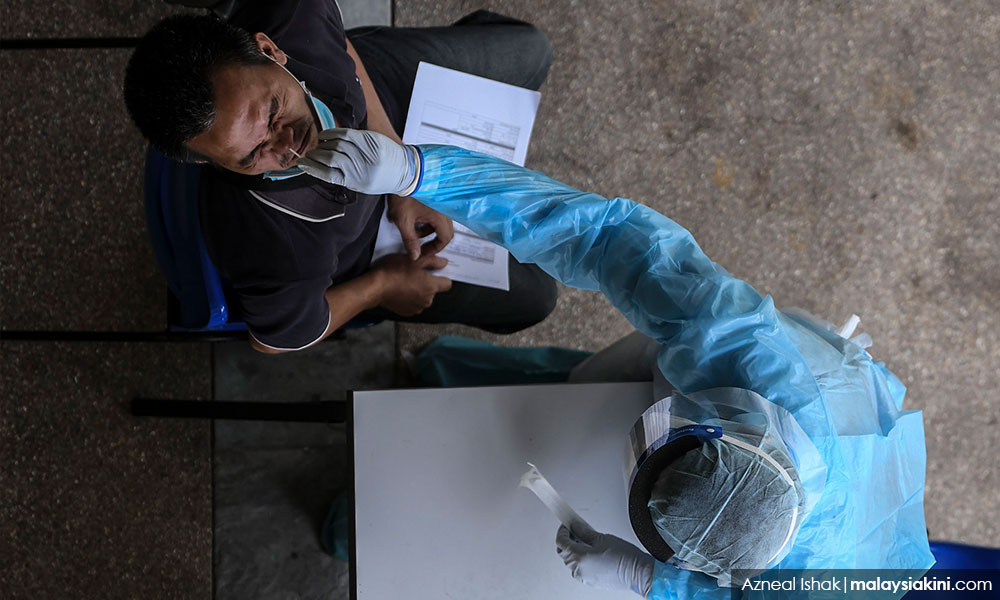
When Covid-19 screening is done, health workers would need to change the outer layers of the PPE that they are wearing each time a patient is tested.
This means they would need at least one pair of gloves, protective apron, face shield, face mask, and head covering, for each patient tested.
The need to change PPEs for each patient is to prevent cross contamination from one patient to another.
In light of this, Dzulkefly said the government must take efforts to better organise the production of PPEs to ensure there is adequate supply.
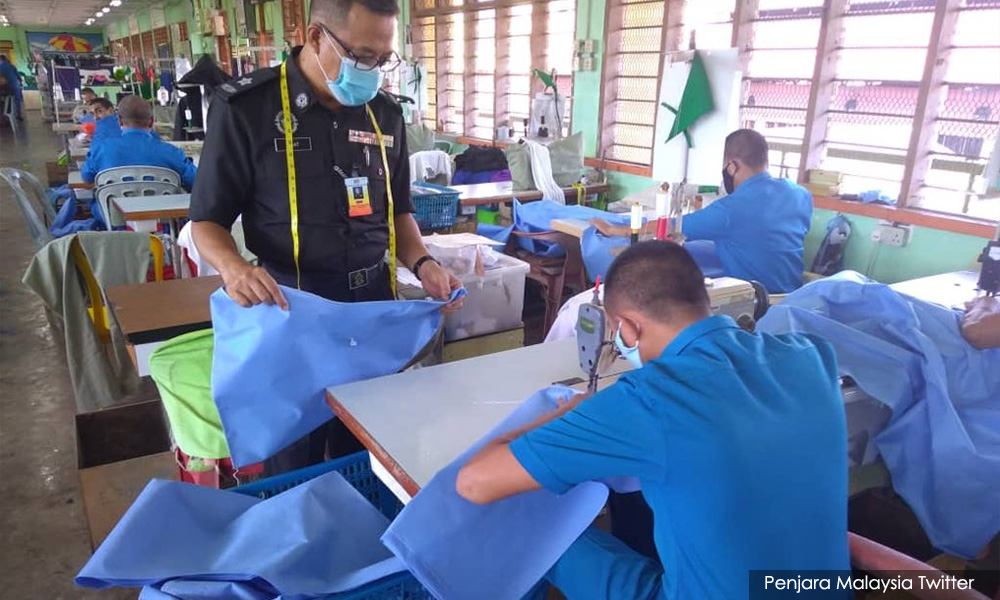
In Selangor, the former health minister said he would discuss with Menteri Besar Amirudin Shari on repurposing industries involved in manufacturing to produce PPEs.
"That would be the way forward. The companies can also earn an income," he added.
One of the doctors who spoke to Malaysiakini also proposed that the government better organise volunteers who are producing PPEs independently in order to improve production.
This is amid the Health Ministry's plan to conduct mass screening, which would further increase the use and demand of PPEs, highlighting the need to ramp up production and distribution.
At present, the availability of such equipment appears to vary from hospital to hospital, with some having sufficient supply.
One specialist, who works in a public hospital in the central region, told Malaysiakini that the hospital he works at has been receiving a steady supply of PPEs.
"Our hospital personnel have also put in a lot of effort as well to help keep face shields and other PPE components in regular supply," the doctor said on condition of anonymity.
He added that he has not seen the use of makeshift PPEs for some time.
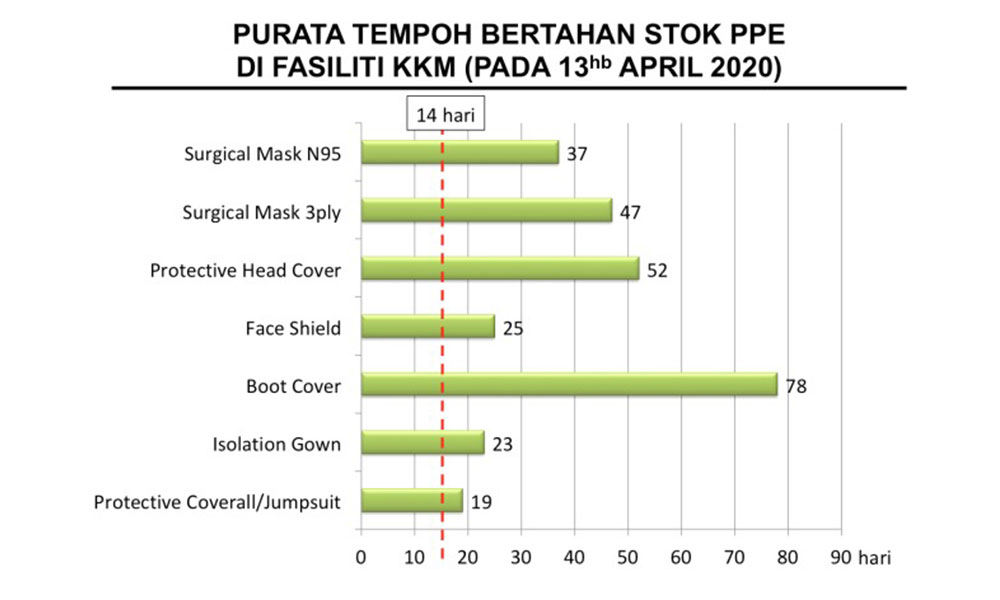 |
PPE stocks |
However, some hospitals are struggling.
A doctor who treats severe acute respiratory infections claimed that while donations of PPEs from China, NGOs and the public have helped, the hospital he is attached to only has a few days worth of PPEs left.
This has forced medical staff at the hospital, which is reportedly treating more than 100 Covid-19 patients, to ration some items such as N95 masks.
"Right now, we don't have enough N95 masks... There's a very, very bad shortage," lamented the doctor, who declined to be named.
He said N95 masks are reserved for health workers performing tasks on Covid-19 patients that could cause aerosolisation, such as intubation, and placing a patient on oxygen.
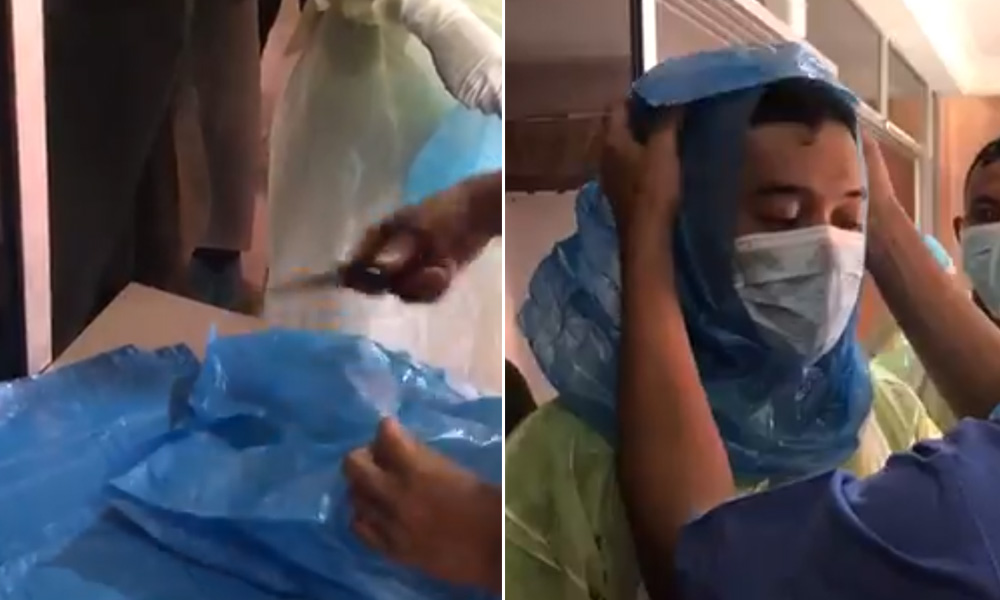 |
'We still use garbage bags for PPE' |
The doctor revealed that there is also a shortage of three-ply surgical masks, leading medical staff being judicious on when to wear them.
"It used to be when you meet a patient, you change to another one (face mask). But now it is almost like a one per day thing," he added.
"It depends on the hospital zone too. Certain zones may have enough, and certain zones may not. So they will use plastic bags," he added.
The doctor said there are concerns that medical staff working in the emergency department might not have adequate protection.
"All it takes is one patient who doesn't know they have Covid-19 (to cause an infection), so there is that concern if they (health workers) don't have adequate protection.
"Ironically, those dealing with positive Covid-19 patients are better protected," he added.
As of April 11, there have been 41 cases of public medical staff being infected with Covid-19 through patients, including nine from patients whose status was unknown prior to treatment.
The majority of patient-to-health worker transmissions are from treating severe acute respiratory infections. The Health Ministry has mandated that all such patients be treated as Covid-19 suspects.
Mass testing will further stress PPE supply
Ensuring adequate and equitable supply of PPE for hospitals would become more important when mass screening for Covid-19 begins.
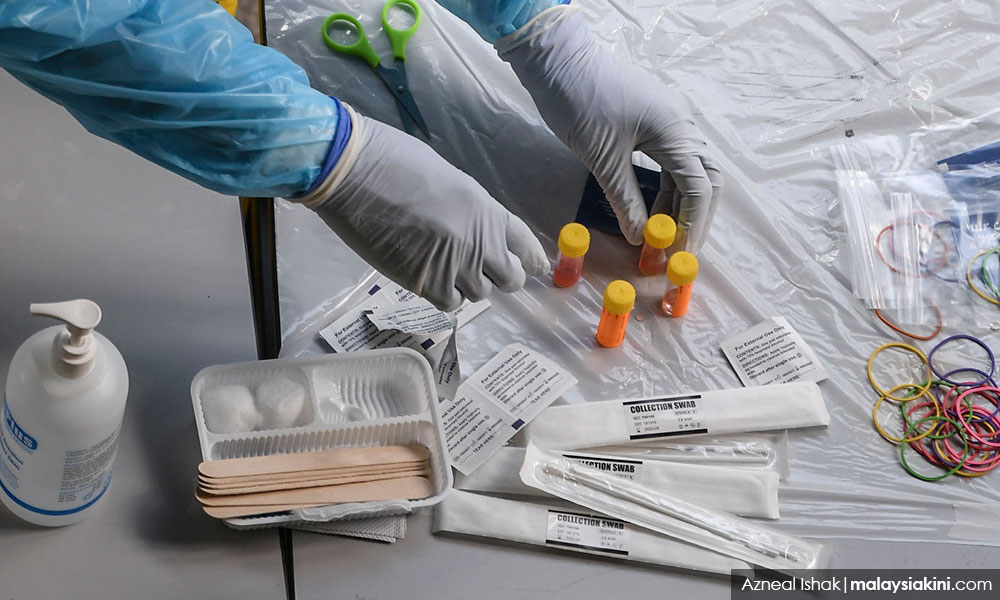 |
The government had aimed to increase the testing capacity to 16,500 a day by the middle of this month, but it remains at 11,500 as of Tuesday.
Health Ministry director-general Dr Noor Hisham Abdullah said yesterday that mass testing can be rolled out soon with the procurement of rapid test kits from South Korea.
However, it is unclear how many tests the ministry plans to perform per day once the kits arrive.
Former health minister Dzulkefly Ahmad, when contacted, said while the ministry's goal to ramp up Covid-19 testing is commendable, proper attention must be given to the wellbeing of healthcare workers as well.
"However, we want to caution and remind them, to make sure our frontliners are not compromised.
"The challenge for the Health Ministry and other facilities, is that there must be an increase in PPEs," he told Malaysiakini.

When Covid-19 screening is done, health workers would need to change the outer layers of the PPE that they are wearing each time a patient is tested.
This means they would need at least one pair of gloves, protective apron, face shield, face mask, and head covering, for each patient tested.
The need to change PPEs for each patient is to prevent cross contamination from one patient to another.
In light of this, Dzulkefly said the government must take efforts to better organise the production of PPEs to ensure there is adequate supply.

In Selangor, the former health minister said he would discuss with Menteri Besar Amirudin Shari on repurposing industries involved in manufacturing to produce PPEs.
"That would be the way forward. The companies can also earn an income," he added.
One of the doctors who spoke to Malaysiakini also proposed that the government better organise volunteers who are producing PPEs independently in order to improve production.






No comments:
Post a Comment